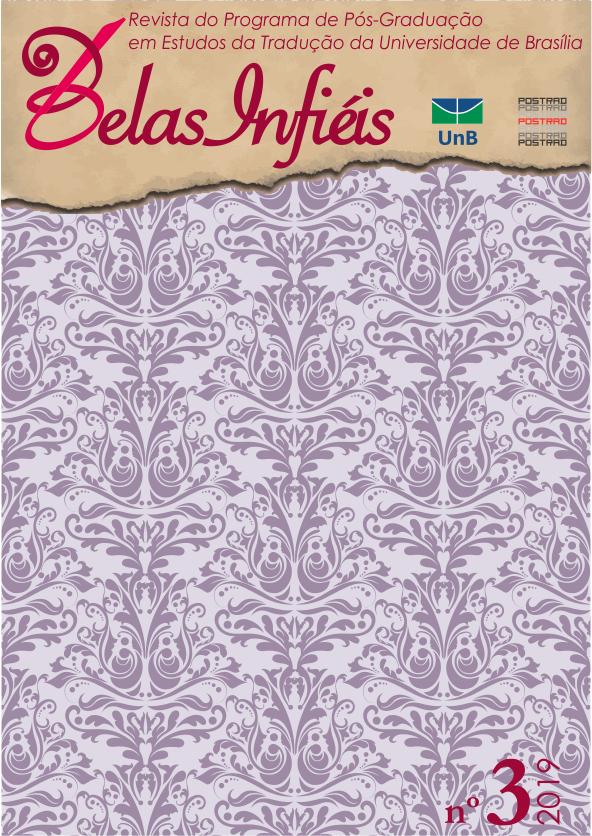Who are you, Maria dear? Recepção de uma proposta de tradução de "As meninas", de Cecília Meireles, entre crianças na Inglaterra
DOI :
https://doi.org/10.26512/belasinfieis.v8.n3.2019.23630Mots-clés :
Estudos da Tradução. Tradução de Literatura Infantil. Pensar Alto em Grupo. Cecília Meireles. Poesia para crianças.Résumé
Em se tratando de poesia, tradutores idealmente procuram recriar, no poema de chegada, correspondentes para todos os atributos poéticos (métrico, fônico, prosódico, semântico) identificados no poema de partida. Na prática, entretanto, somos levados a escolher quais desses atributos priorizar, uma vez que "correspondência em todos os níveis, sem nenhuma perda, é raramente possível em tradução poética" (Britto, 2002). Não raro nos perguntamos em que medida as alterações, cortes ou acréscimos, feitos em nome da métrica ou da rima, por exemplo, interferem na interpretação do poema traduzido. Nas traduções para o público infantil, há um complicador que intensifica a dúvida: a relação assimétrica (maturidade, bagagem cultural e linguística) entre as crianças leitoras e os adultos que escrevem ou traduzem para elas (Azenha, 2008). Para reduzir essa assimetria e garantir a aceitação da obra junto ao público, é recomendável que os tradutores procurem se aproximar da linguagem do tempo para o qual traduzem (Azenha, 2005), além de terem algum contato com crianças da idade daquelas para quem traduzem (Lathey, 2016). Em que pesem as recomendações de Azenha e Lathey, e os avanços nos estudos sobre tradução de literatura infantil feitos nos últimos trinta anos, ainda são poucos os estudos que levam em conta a resposta do público leitor. Neste artigo, pretendo dar minha contribuição para reduzir essa lacuna: primeiro apresento minha proposta de tradução do poema "As meninas", de Cecília Meireles, e em seguida os dados de duas vivências com grupos de crianças estrangeiras de 9 e 10 anos de idade, que leram e discutiram o poema traduzido, intitulado "Girls at the window". As vivências foram realizadas em duas escolas da Inglaterra, dentro da prática de letramento Pensar Alto em Grupo (Zanotto, 2014), também brevemente explicada neste artigo.
Téléchargements
Téléchargements
Publié-e
Comment citer
Numéro
Rubrique
Licence
Copyright Statement
Given the public access to this journal, the texts are free to use but requires the recognition of the original authorship and initial publication in this journal to be properly stated.
The journal allows the use of works published for non-commercial purposes, including the right to submit the work to publicly accessible databases. Published contributions are the sole and exclusive responsibility of the author(s).
- When submitting papers to be evaluated by the Belas Infiéis journal, the author(s):
- Declare that the contents of the contributions are original and of their original creation, being entirely responsible for their content if there is an objection by third parties.
- Claim to be aware that they should not commit academic plagiarism.
- Declare that the manuscript has not been published, completely or partially, in Portuguese or another language. If it is a translation it should be submitted to the Translated Articles section.
- Declare that the manuscript is not being evaluated by other journals.
- Declare that the manuscript was not submitted to another journal simultaneously.
- Commit(s) to inform the journal of any kind of error or inaccuracy in their contribution (published, in evaluation or in editing) and to collaborate with the editors to make due corrections of the article (when in evaluation or editing) or erratum/retraction (after publication).
- Declare that there is no conflict of interest regarding the published work.
- Authorize its release if it is accepted for publication without any kind of monetary compensation.
- Agree to assign non-exclusive rights to publication to the magazine, remaining free to make their contribution available in other media as long as the publication of the first version in Belas Infiéis magazine is mentioned. They also authorize Belas Infiéis to assign their texts for reproduction in content indexers, virtual libraries and similar platforms.
- Maintain copyright and grant the journal the right of first publication, the work being licensed under theCreative Commons Attribution License.
- Is/Are allowed and encouraged to publish and distribute their work online after the editorial process, which may increase the impact and citation of the published work.
- Authorize the editorial team to make textual adjustments and to adapt the article to the publication rules, when necessary.



















